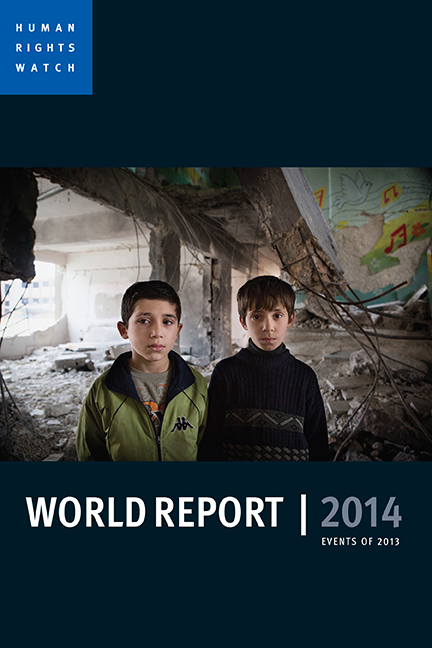Book contents
- Frontmatter
- Dedication
- HUMAN RIGHTS WATCH
- Table of Contents
- Foreword
- Rights Struggles of 2013: Stopping Mass Atrocities, Majority Bullying, and Abusive Counterterrorism
- The Human Rights Case for Drug Reform How Drug Criminalization Destroys Lives, Feeds Abuses, and Subverts the Rule of Law
- Putting Development to Rights: Integrating Rights into a Post-2015 Agenda
- The Right Whose Time Has Come (Again) Privacy in the Age of Surveillance
- Photo Essays
- AFRICA
- AMERICAS
- ASIA
- EUROPE AND CENTRAL ASIA
- MIDDLE EAST AND NORTH AFRICA
- UNITED STATES AND CANADA
- 2013 HUMAN RIGHTS WATCH PUBLICATIONS
- Acknowledgments
- Frontmatter
- Dedication
- HUMAN RIGHTS WATCH
- Table of Contents
- Foreword
- Rights Struggles of 2013: Stopping Mass Atrocities, Majority Bullying, and Abusive Counterterrorism
- The Human Rights Case for Drug Reform How Drug Criminalization Destroys Lives, Feeds Abuses, and Subverts the Rule of Law
- Putting Development to Rights: Integrating Rights into a Post-2015 Agenda
- The Right Whose Time Has Come (Again) Privacy in the Age of Surveillance
- Photo Essays
- AFRICA
- AMERICAS
- ASIA
- EUROPE AND CENTRAL ASIA
- MIDDLE EAST AND NORTH AFRICA
- UNITED STATES AND CANADA
- 2013 HUMAN RIGHTS WATCH PUBLICATIONS
- Acknowledgments
Summary
An unexpected push south by Islamist armed groups in January 2013 provoked a French-led military offensive that quickly dislodged the groups and largely ended their abusive occupation of the north. During and after the offensive, Malian soldiers committed numerous abuses, particularly against civilians and rebel suspects in their custody.
Fears about the threat posed by Islamist armed groups linked to Al-Qaeda led to considerable diplomatic efforts to resolve the crisis and stabilize Mali. The French took the lead on military matters, the European Union on training and security sector reform, and the United Nations, through the establishment of a peacekeeping force, on rule of law and political stability. While most of these actors criticized abuses by the Islamist groups, they were reluctant to publicly criticize those by the Malian army.
Largely free, fair, and transparent presidential elections in August helped stabilize the political situation. However, security was undermined by persistent communal tensions, uncertainty about the status of Tuareg rebels; ongoing attacks by Islamist groups, including suicide bombings; divisions within the military; and rising criminality.
Malian authorities made little effort to investigate and hold accountable members of the security forces implicated in abuses. However, in January, the prosecutor of the International Criminal Court (ICC) opened an investigation into crimes allegedly committed in the three northern regions of the country. The Ouagadougou Accord signed in June by the Malian government and two Tuareg groups was ambiguous about whether those responsible for serious crimes would be prosecuted.
The rule of law in the north was undermined by the slow return of members of the judiciary and police to the north. Inadequate budgetary allocations for the criminal justice system in general limited due process throughout the country. Graft and corruption, endemic at all levels of government, further impeded Malians’ access to basic health care and education.
Abuses by State Security Forces
Malian soldiers, in their campaign to retake the north, committed numerous abuses, including summary executions, enforced disappearances, and torture. The abuses, which targeted suspected Islamist rebels and alleged collaborators, included at least 26 extrajudicial executions, 11 enforced disappearances, and over 50 cases of torture or ill-treatment.
- Type
- Chapter
- Information
- World Report 2014Events of 2013, pp. 143 - 147Publisher: Bristol University PressPrint publication year: 2014



